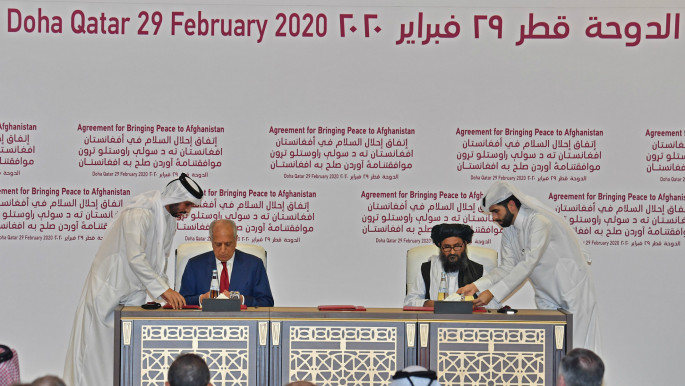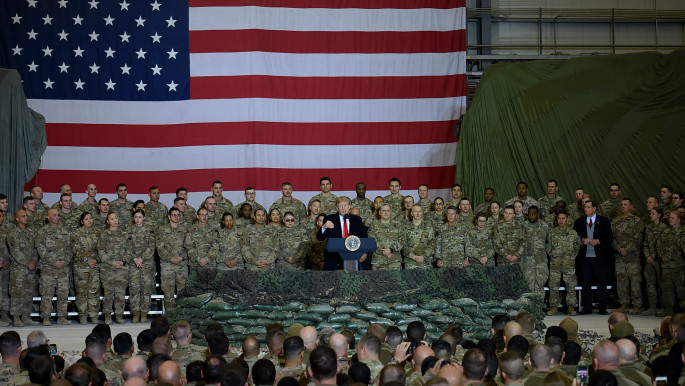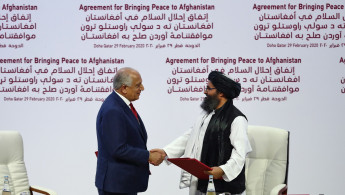Is Afghanistan on the brink of a Middle-East proxy war as US looks to exit?
Who the father of the groom is could be open for debate, but the pivotal role played by Gulf countries, Qatar in particular, in finding a way to end one of the most complex wars in history is unmatched and signifies their indispensable position in the global geopolitical stage.
While Qatar did the hardest job of bringing the Taliban to the negotiation, Saudi Arabia and the UAE were also instrumental in securing what should be described as the "deal of the century".
Now the question arises: Would Afghanistan be another battleground for regional rivals, Saudi Arabia and Iran, and their allies, who all look to muscle in on the vacuum left by the US in what is rightly described as the graveyard of empires?
Changing equations
Despite its remoteness from the Gulf countries, Afghanistan has been an integral part of their foreign policy for decades. Saudi Arabia's involvement dates back to the 1980s when it supported the Americans against the Soviet occupation of the country.
 |
|
| Read also: How Pakistan and Qatar played a key role in brokering the Afghan peace deal |
Various stakeholders in the Afghan conflict have switched their allegiances several times, a fact that underlines the land-locked country's importance, not just for its neighbours but also for the wider region.
Support from Pakistan, Saudi Arabia, and the UAE was a major catalyst in the rise of the Taliban in the 1990s. The three countries continued to propel the group, becoming the only three states to recognise the Taliban regime after it took power in 1996.
On the opposite front were Iran, Russia, and the US who threw their weight behind the Northern Alliance, a coalition of non-Pashtun groups.
But 9/11 and its aftermath redrew the geopolitical map pitting the extremist group against its former friends, Riyadh and Abu Dhabi, who sided with the US in its so-called war on terror.
 |
Support from Pakistan, Saudi Arabia, and the UAE was a major catalyst in the rise of the Taliban in the 1990s. The three countries continued to propel the group, becoming the only three states to recognise the Taliban regime after it took power in 1996 |  |
Iran, meanwhile, sought to use the turmoil in its favour by developing ties with the Taliban. Russia also followed a similar path and has even reportedly supplied arms and funds to the group.
Animosity of Saudi Arabia and the UAE towards the Taliban grew thanks to their alliance with the US. The Gulf allies tried to discredit the insurgents' jihad and even destroy the group from within, reportedly sowing division in their ranks.
No longer ago, the kingdom was accused of taking advantage of a rift in the extremist ranks when Mullah Haibatullah Akhundzada, who has cultivated ties with Iran, took over the group.
Driven by the interests of the US, the kingdom has tried several times to prop up the rebels fighting against the Taliban by brokering a deal between them and the Kabul government.
It has also tried to negotiate peace with the Taliban under successive governments of Hamid Karzai and Ashraf Ghani but to no avail. The mistrust between both the sides grew as the Taliban saw the Saudis' propensity to ally with the US and the Afghan regime as a betrayal.
Pragmatic approach
Even amid their visible hostility towards the Taliban, both Saudi Arabia and the UAE jockeyed for influence over the group looking to have a say in the endgame of the Afghan conflict.
 |
| Will the US-Taliban negotiations settle Afghanistan's political problem? |
But all such efforts failed partially because the Taliban considered some of their conditions as unrealistic. For example, the Saudis and the Emiratis persuaded the Taliban to open their political office in their countries in 2013. But the Taliban chose Doha, a move that angered Riyadh and Abu Dhabi.
Since then Saudi Arabia and the UAE have urged US President Donald Trump to close down the Taliban office and cited the group's presence in Doha as one of the reasons for their blockade of Qatar in 2017.
Read also: The Gulf Crisis: Fear and Loathing on the Arabian Peninsula
Also, the Taliban's decision to move negotiations with the US from Abu Dhabi to Doha in 2018 did not go down well with Mohammed bin Zayed, Abu Dhabi's crown prince. Following this, reports emerged that Bin Zayed had proposed an assassination campaign against the leaders of the Taliban.
But the Taliban's recent spectacular rise and its growing military power had convinced the kingdom and its allies to embark on a path of political pragmatism.
It also coincided with an unprecedented resolve for peace from Trump who constantly faced hard questions from his critics about his election promise of bringing back the American troops from Afghanistan.
Saudi Arabia and the UAE gradually started to take centre stage in the peace process as part of a four-nation group – also including Pakistan – formed by the US National Security Council.
Their urgency to clinch a deal with the Taliban stemmed from their recognition of current political realities. They realised that they had more to gain from working with the Taliban than turning against the group that now controls more areas in Afghanistan than at any point of time.
Riyadh was also mindful that its regional rival Iran was also preparing a gambit in order to shape Afghanistan in its favour following the US withdrawal from the country.
The involvement of Saudi Arabia and the UAE at some point risked opening old wounds with certain Taliban factions who were never willing to forgive the two sides and had nurtured closer ties with the kingdom's biggest rivals, Iran and Qatar.
Nonetheless, the kingdom was able to overcome the major obstacle of earning the Taliban leadership's trust thanks to its religious clout and strong endorsement from Pakistan who wields significant influence on the Taliban.
 |
Riyadh was also mindful that its regional rival Iran was also preparing a gambit in order to shape Afghanistan in its favour following the US withdrawal from the country |  |
A proxy war looming?
For Saudi Arabia, the post-peace political landscape in Afghanistan offers new impetus to its ambitions of countering Iran which shares a 900-kilometre border with Kabul. There is a real risk of the Saudi-Iran geopolitical feud spilling over into Afghanistan following the US troops pull-out from there.
The kingdom could use Afghanistan as a launchpad for attacks against Iran, the same way Iran-backed Houthi rebels have carried out operations hitting targets inside the kingdom.
It is a cruel irony that just months ago, following the killing of top Iranian general Qasem Soleimani by the US, analysts were speculating the possibility of an Iranian proxy war against the Americans stationed in Afghanistan using the Taliban. But the tables have turned so quickly that Tehran now faces the prospect of countering Saudi-backed elements just across its border.
The success of the current agreement now depends on the intra-Afghan talks with the Taliban but even if they fail, it is unlikely to matter little to Saudi Arabia and the UAE as long as the US honours the deal and goes ahead with its withdrawal from Afghanistan.
Kabul never poses an immediate security threat to the Gulf countries and their only commitment in Afghanistan was tied to the US presence there.
 |
Kabul never poses an immediate security threat to the Gulf countries and their only commitment in Afghanistan was tied to the US presence there |  |
Another nightmare for Iran is its deteriorating ties with its neighbour Pakistan who would find it hard to resist a Saudi pressure to join Riyadh's plans in Afghanistan. Both Tehran and Islamabad already accuse each other of using separatist groups to sow discord in their countries.
But it will not be an easy ride for Saudi Arabia as Iran has worked quietly and relentlessly to develop ties with the Taliban.
The death of former Taliban chief Mullah Mansour in a US drone strike in Pakistan in 2016 had shed light on the alliance between the Shia regime and the Sunni jihadist group. The current Taliban leader Haibatullah Akhundzada is said to have sought refuge in Iran in 2017. Iran has also allegedly hosted training camps and armed the Taliban fighters.
It will be interesting to watch how the Taliban and President Ashraf Ghani preserve their strategic ties with Iran and Saudi Arabia and their allies without getting caught in the crosshairs of a Middle Eastern power struggle playing out in Afghanistan.
Shan. A. Zain is a journalist and writer based in New Delhi, covering foreign policy and international security issues in Asia and the Middle East.
Follow him on Twitter: @shaan_zain



